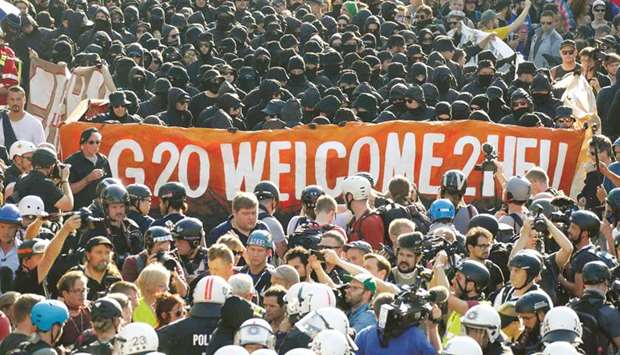US President Donald Trump warned that the future of the West was at risk and lashed out at Russia and North Korea yesterday at the start of a high-stakes trip to Europe.
In key US ally Poland on the first leg of the trip, he accused Russia of “destabilising” action in Ukraine and warned North Korea it faced “consequences” after an intercontinental ballistic missile test that has alarmed the international community.
On the eve of what is likely to be a prickly G20 summit in Hamburg, Trump — who faces animosity from traditional US allies — used his keynote address in Warsaw to warn that a lack of collective resolve could doom an alliance that endured through the Cold War.
“The defence of the West ultimately rests not only on means but also on the will of its people to prevail,” he said.
“The fundamental question of our time is whether the West has the will to survive.”
Seeking to ease allies’ concerns about the US commitment to Nato, Trump endorsed its one-for-all-and-all-for-one mutual defence pact.
“The United States has demonstrated not merely with words, but with it actions, that we stand firmly behind Article Five,” he said, while calling for more defence spending on the eastern side of the Atlantic.
“The transatlantic bond between the United States and Europe is as strong as ever, and maybe in many ways, even stronger,” he added.
Speaking in a country alarmed by Moscow’s increasing military assertiveness, Trump hit out at Russia, just a day before his highly anticipated first face-to-face talks with President Vladimir Putin at the G20.
“We urge Russia to cease its destabilising activities in Ukraine and elsewhere, and its support for hostile regimes — including Syria and Iran — and to instead join the community of responsible nations in our fight against common enemies and in defence of civilisation itself.”
He also said Moscow “may have” tried to influence the 2016 election that brought him to power, but suggested others too may have been involved and blames his predecessor Barack Obama for failing to act.
Arriving at the G20 host city Hamburg later yesterday, Trump headed in the evening to talks with German Chancellor Angela Merkel, who has vowed to defend the 2015 Paris climate accord which the US leader has pledged to withdraw America from.
Trump would then hold a dinner meeting with leaders of South Korea and Japan, when focus will be trained on another crisis that erupted this week when Pyongyang successfully tested an ICBM that could deliver a nuclear payload to Alaska.
In his first public remarks since the test, Trump said in Warsaw that Pyongyang’s military sabre-rattling must bring “consequences” and warned he was considering a “severe” response to its ‘very, very bad behaviour”. After repeatedly urging Beijing to ratchet up the economic pressure on North Korea, Trump will hold what promises to be a testy meeting with Chinese President Xi Jinping on the sidelines of the G20.
The White House wanted to use Trump’s Warsaw speech — with its echoes of historic addresses overseas by Ronald Reagan and John F. Kennedy — to burnish his credentials as a global statesman and deflect suggestions he is making the United States a virtual pariah.
Speaking in front of 10,000 people at Krasinski Square — which memorialises the Warsaw uprising against Nazi occupation — Trump pointed to Poland as an example of resolve in the defence of Western traditions.
“The people of Poland, the people of America, and the people of Europe still cry out ‘We want God’,” Trump said. Referring to the Nazi and Soviet invasions of Poland, he said: “That’s tough.”
But he is likely to encounter a cool reception elsewhere.
Thomas Wright from the Brookings Institute said that Trump’s backing of Nato’s Article Five and reference to the Russian threat had done the “bare minimum” to repair a speech he made to the alliance earlier this year.
“But its overall thrust was one of nationalism and sovereignty,” he said.
“The great risk is that in his off-the-cuff remarks he will begin dividing Europe into old and new — or those who don’t like him and his message and those who do.”
While Trump positions himself as a leader with the vision to confront an epoch-making crisis, for many US allies in Europe and beyond it is Trump himself who has called the world order — and a century of American global leadership — into doubt.
US President Donald Trump faces being isolated on global warming at the Group of 20 summit of major economic powers, according to the draft communique of the G20 meeting seen by DPA.
The leaders attending the summit — several of whom expressed their anger over Trump’s move last month to ditch the Paris climate change accord — want the Hamburg meeting to call for the “rapid implementation” of what they believe to be an “irreversible” agreement.
The draft document does acknowledge US efforts aimed at reducing carbon dioxide (CO2) emissions, which are seen as causing global warming.
“The United States reaffirms its strong commitment to a global approach that lowers emissions while supporting growth and improving energy security needs,” the draft reads.
But the summit’s draft communique says pointedly: “We take note of the decision of the United States of America to withdraw from the Paris Agreement.”

German riot police stand in front of protesters during the G20 summit in Hamburg, Germany.
